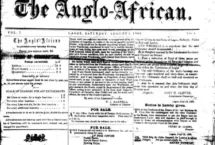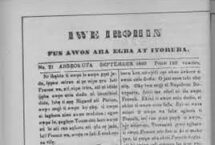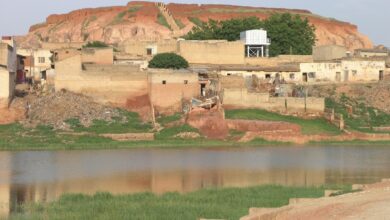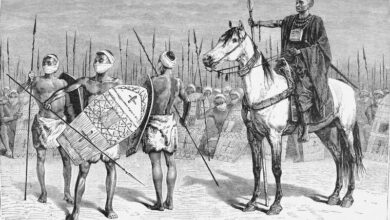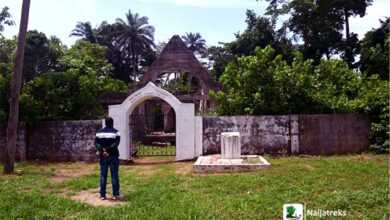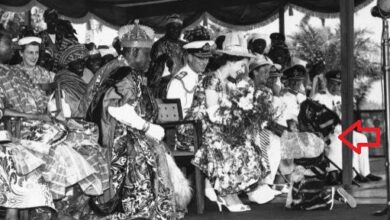The Lagos Observer (1882-1888)
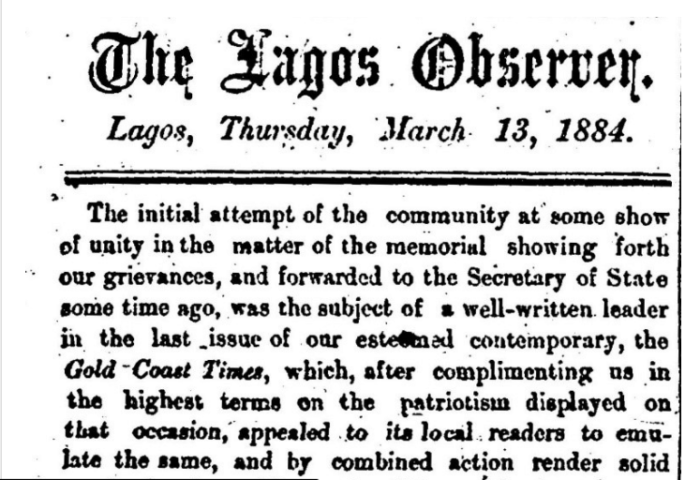
The Lagos Observer, the fourth newspaper in Nigeria, was founded in Feb. 1882 by J. Bagan Benjamin, an African member of the Lagos Chamber of Commerce. The newspaper had the moral and financial support of Dr. N. T. King while Robert Campbell served as the chairman of the editorial committee.
The Lagos Observer was a fortnight newspaper sold for six pence per copy. Its printing & publishing office was located at Bishops Street, Lagos. The Lagos Observer beamed its searchlight on the social life of the people through its column “Tit-bit”, a column by which it exposed social and public evils.
The newspaper also advocated for social improvements like good roads and the building of markets. The Lagos Observer was actively involved in nationalist issues. According to Ayandele, “the paper’s view on these issues was radical and anti-imperialist“.
The Lagos Observer suffered a great blow in 1884 following the death of Dr. King and Robert Campbell, two frontline Lagosians advocating the separation of the administration of Lagos from the Gold Coast. In as much as Benjamin was shocked by the death of his sponsors, he was not deterred, he continued with the paper.
The newspaper championed cultural nationalism by advocating religious independence in keeping with early nationalist feeling which were in favour of succession of churches from their parent bodies in England. The newspaper also gave its pages to the championing of ideas advocating independent African religion, where such practices as polygamy are allowed.
It also gave its pages to ideas, advocating lay participation in church government. Omu describes the paper as one of the most successful newspapers of the nineteenth century.
The Lagos Observer was vociferous, outspoken, pungent and oozed out radicalism in content and outlook. In its issue of February 6, 1886, it carried the following statement by a layman;
“The time has unmistakably come when Christians in these part especially those of the Episcopal church should have a deeper insight of the state of things concerning church matters than hitherto been evinced and endeavoured to find out, by feeling the way carefully, whether it is feasible to organize an African church under the system adopted by the Congregationalists. We cry aloud complaining and echo reverberates the sound and a voice in reply comes to us ringing the word in our ears, a succession, a succession”.
The nationalist ferment made possible the establishment of the native Baptist Church in April 1883, the first African Church in Nigeria.
The paper also involved itself in the administration of justice in Nigeria. In its issue of May 18, 1882, J. B. Benjamin wrote an article on the administration of justice in which he alleged that the judges were involved in anti-Negro prejudices. For this, he was charged with criminal libel.
He pleaded fair comment, but the district commissioner charged that the passage imputed corruption on those who administered the colony, the newspaper disappeared from the newsstand on December 29, 1888. The publisher Benjamin tried his hand on another newspaper ” Lagos Echo” though it was short-lived.
Thanks for reading, OldNaija.
References:
- Daramola, I. (2006). History and Development of Mass Media in Nigeria. Amsterdam University Press.
- Omipidan, T. (n.d.). First Twelve Newspapers In Nigeria. Teslim Omipidan. Retrieved September 12, 2021, from https://oldnaija.com/tag/first-twelve-newspapers-in-nigeria/
- Omobowale, Ayokunle & Akanle, Olayinka. (2021). The Locus of the Subjective Approach in Social Research. 2.
Questions? Advert? Click here to email us.



